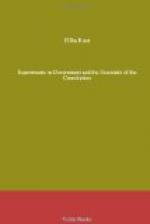The wisest of all the fathers of the Republic has spoken, not for his own day alone but for all generations to come after him, in the solemn admonitions of the Farewell Address. It was to us that Washington spoke when he said:
“The basis of our political systems is the right of the people to make and to alter their constitutions of government; but the Constitution which at any time exists, till changed by an explicit and authentic act of the whole people, is sacredly obligatory upon all.... Towards the preservation of your government, and the permanency of your present happy state, it is requisite, not only that you steadily discountenance irregular oppositions to its acknowledged authority, but also that you resist with care the spirit of innovation upon its principles, however specious the pretexts. One method of assault may be to effect, in the forms of the Constitution, alterations which will impair the energy of the system, and thus to undermine what cannot be directly overthrown. In all the changes to which you may be invited, remember that time and habit are at least as necessary to fix the true character of governments as of other human institutions; that experience is the surest standard by which to test the real tendency of the existing constitution of a country; that facility in changes, upon the credit of mere hypothesis and opinion, exposes to perpetual changes, from the endless variety of hypothesis and opinion.”
While, in the nature of things, each generation must assume the task of adapting the working of its government to new conditions of life as they arise, it would be the folly of ignorant conceit for any generation to assume that it can lightly and easily improve upon the work of the founders in those matters which are, by their nature, of universal application to the permanent relations of men in civil society.
Religion, the philosophy of morals, the teaching of history, the experience of every human life, point to the same conclusion—that in the practical conduct of life the most difficult and the most necessary virtue is self-restraint. It is the first lesson of childhood; it is the quality for which great monarchs are most highly praised; the man who has it not is feared and shunned; it is needed most where power is greatest; it is needed more by men acting in a mass than by individuals, because men in the mass are more irresponsible and difficult of control than individuals. The makers of our constitution, wise and earnest students of history and of life, discerned the great truth that self-restraint is the supreme necessity and the supreme virtue of a democracy. The people of the United States have exercised that virtue by the establishment of rules of right action in what we call the limitations of the constitution, and until this day they have rigidly observed those rules. The general judgment of students of government is that the success and permanency of the American system of government are due to the establishment and observance of such general rules of conduct. Let us change and adapt our laws as the shifting-conditions of the times require, but let us never abandon or weaken this fundamental and essential characteristic of our ordered liberty.




